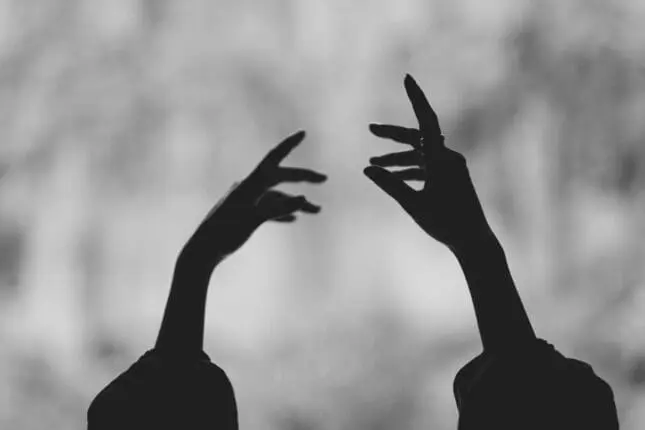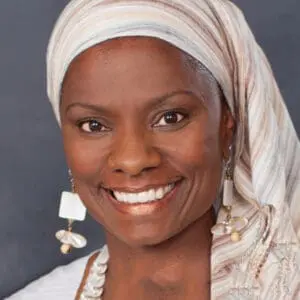As an African American woman from New York City now living in Baltimore, Maryland, I saw COVID hit my communities hard. The summer of 2020 death toll was reminiscent of the 1990’s AIDS epidemic. My friends were dropping like flies, and I was doing a lot of grief work with clients and the countless mind–body–spirit groups I conducted online.
My capacity for holding people in their grief was strengthened through my years of working with addicts. They die—a lot. Client funerals are part of the work. So I’ve learned to let grief run through me, and never run from the reality of my heart’s need to shed tears over the loss of yet another beautiful soul. I don’t run from my own sorrow. Instead, I greet it. I’ve found it’s impossible to love deeply without it.
Every April, I hold an annual forgiveness retreat. This year’s was online. During a break from our meeting, I jumped on Facebook, where a notice about one of my dearest friends appeared. There was her picture, and under it, a note that she was dead.
I ran upstairs, bawling like crazy, seeking the loving comfort of my husband’s arms. I only had 15 minutes before I had to go back to the group. When I returned, I was slightly calmer, but I didn’t hold back the news.
I kept my camera on (and looked a bit of a mess) as I shared. They got it. And they were tearing up with me. While I was processing the news, my mind went to those news images of all the COVID bodies covered in sheets or zipped into body bags and put into piles. Will that be her fate? I suddenly thought. Will she be in one of those bags?
A new wave of grief rushed through me at the idea of this, and I had to reach out my hands and try to steady myself against the desk. Then, in a trembling voice, I told my group, “I’m scared that they won’t respect her body, and that she’s not going to be buried right away.”
I was having trouble shaking the thought of all those bodies, all those loved ones stacked up like folding chairs, when I remembered that my friend was also a mother of six, and one of her kids has special needs and is living in a program. Suddenly, I felt this grief and this pressing fear for her child, and I ended up asking my participants out loud, “What’s going to happen to that kid?”
I rushed ahead and told the group what I needed, which at that moment was three deep breaths, and for each of them to write her name in the chat, as a practice of naming the dead.
Feeling each group member’s understanding that I was a human being—a woman who’d loved her friend and was joined with them in their suffering—was enough for me in that moment. Ultimately, it was enough for all of us to move on and continue with our retreat.
In mind-body skill groups, the facilitator is a participant, so when I hold these groups, I’m still showing up, without sucking up all the air. When I share my own grief in these groups, I’m still leading. In one-on-one work, it’s rare for me to say something like “I lost my friend.” But in a group, I find the container for all of us is strengthened by sharing my own experiences.
The gift of COVID is that it’s allowed us to increase our comfort around talking about death. In social work school, we’re taught to restrain feelings of sorrow or to cry with clients, but I feel it’s only strengthened the work. There’s a balance, and we have to ask, “What does fighting that grief in sessions do to your own heart and well-being?”
By December 2020, I’d lost track of the number of friends, and friends of friends, lost to COVID. A friend sent a link for her mother’s funeral and included information for the in-person funeral. I thought I’d be the only one there, but other friends came, too. We wore masks and cried the remaining unshed tears of our lost year. Later, we drove to the cemetery, armed with our own shovels and gloved hands. Despite the brutal cold and snow, we asked the attendants to step aside, and buried her together. That burial was not only for one lost mother, but for all the lost matriarchs, snatched from us in a destructive wave that none of us had been prepared for. While we were filthy on the outside, covered in the soil of her resting space, we were cleansed on the inside. It was one of the most beautiful funerals ever.
When you do the work that we do, it’s important to find ways to take care of yourself. You can’t always carve out lots of time to devote to self-care, but we have ways to prioritize it.
Back before the days of Zoom, people used to come into my office and have tea. That’s what I got to do for a living! Have tea with people! Now, I’m taking a week off every seven weeks. I’ve worked it into my schedule. I do nothing on those weeks off. I lie in bed. I sew. I spend time with my parents. I dance around my basement. I call people just to tell them that I love them. Sometimes, I eat a tad too much of my husband’s amazing cooking.
I also have a spiritual practice. I pray five times a day, and meditate every morning. I read a paragraph or two from my Sufi teacher’s primary text, and I write it down. And usually, once a day, I put music on. I’ve got this great playlist, called “Sweet Sixteen in 1982,”and it’s got Prince’s “1999,” and Stevie Wonder’s “Do I Do,” and Luther Vandross’s “Never Too Much,” and Earth, Wind & Fire’s “Let’s Groove Tonight,” and Michael McDonald’s “I Keep Forgetting.”
Most days, I dance to it in the office or on the screened-in porch. You should try it. Or just come over. There’s tea.
Photo by Sadi Gökpınar / Pexels
Sabrina N'Diaye
Sabrina N’Diaye, PhD, LCSW-C, is an integrative psychotherapist, storyteller, and peacebuilder, based in Baltimore, MD. Her first book is Big Mama Speaks: Love Lessons from a Harlem River Swan.













